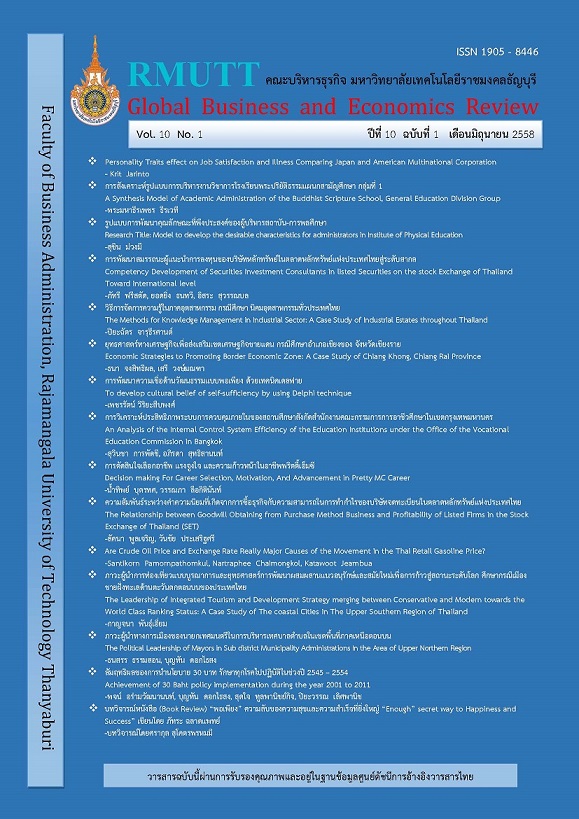AN ANALYSIS OF THE INTERNAL CONTROL SYSTEM EFFICIENCY OF THE EDUCATION INSTITUTIONS UNDER THE OFFICE OF THE VOCATIONAL EDUCATION COMMISSION IN BANGKOK
Keywords:
Efficiency, Internal Control, COSOAbstract
The purposes of this research study were to study the demographic factors affecting the internal control system efficiency based on the concept of COSO and operating performance, to study the relationships among the administrative factors, the internal control system efficiency, and operating performance, and to study the relationships between the internal control system efficiency based on the concept of COSO and performance efficiency. The population included a total of 2,029 of executives, instructors, and staffs from the 20 education institutions under the Office of the Vocational Education Commission in Bangkok. As a result, the samples consisted of 334 participants, and the questionnaire was used as an instrument for data collection. Statistics used for data analysis included Frequency, Percentage, Mean, Standard Deviation, the Independent Samples t-test, F-test (One-way ANOVA), Least Significant Difference (LSD), and Pearson Simple Correlation. The results could be concluded into 5 points: (1) the demographic factors including age and work experience affected the internal control system efficiency based on the concept of COSO in the aspects of risk assessment, information technology and communication, and follow up and evaluation; (2) the demographic factors including age, work experience, and level of education affected performance where age and work experience affected the quality of work, work quantity, time, methods, and expenses while the level of education affected the quality of work and work quantity; (3) the administrative factors including readiness of personnel and trainings were positively related to the internal control system efficiency based on the concept of COSO in a term of risk assessment at medium level as an overall; (4) the administrative factors including readiness of personnel and trainings were positively related to performance in terms of the quality of work and work quantity at low level as an overall; and (5) the internal control system efficiency based on the concept of COSO in the aspect of risk assessment was positively related to performance in terms of the quality of work and work quantity at medium level as an overall.
References
กุสุมา โสเขียว. (2549). ผลกระทบของประสิทธิภาพการควบคุมภายในและสภาพแวดล้อมธุรกิจที่มีต่อคุณภาพข้อมูลทางการบัญชี. (วิทยานิพนธ์ปริญญามหาบัณฑิต, มหาวิทยาลัยมหาสารคราม).
ทวีศักดิ์ ไทยประดิษฐ์. (2545). ความสัมพันธ์ระหว่างกระบวนการบริหารโรงเรียนและกระบวนการประกันคุณภาพภายในของโรงเรียนที่ผ่านเกณฑ์และโรงเรียนที่ไม่ผ่านเกณฑ์มาตรฐานคุณภาพนักเรียน ในสำนักงานประถมศึกษาจังหวัดเพชรบุรี. (วิทยานิพนธ์ปริญญามหาบัณฑิต, มหาวิทยาลัยราชภัฎ เพชรบุรี).
ธนัชชา โยธาทัย.(2549). ความสัมพันธ์ระหว่างประสิทธิผลการควบคุมภายในกับผลการดำเนินงานของสหกรณ์การเกษตรในเขตภาคตะวันออกเฉียงเหนือ. (วิทยานิพนธ์ปริญญามหาบัณฑิต, มหาวิทยาลัยมหาสารคาม).
ภิญญาพัชญ์ พูลสวัสดิ์. (2552). ความคิดเห็นเกี่ยวกับประสิทธิภาพการดำเนินงานขององค์การบริหารส่วนตำบลในเขตอำเภอบางบ่อ จังหวัดสมุทรปราการ. (วิทยานิพนธ์ปริญญามหาบัณฑิต, มหาวิทยาลัย ราชภัฎธนบุรี).
ศุภชัย ลีลิตธรรม. (2554). ศกึษาความเป็นไปได้ในการน าระบบการควบคุมภายในตามแนวทาง COSO มาใช้กับการบริหารการไฟฟ้าส่วนภูมิภาค เขต 1 (ภาคใต้) จังหวัดเพชรบุรี. (วิทยานิพนธ์ปริญญา มหาบัณฑิต, มหาวิทยาลัยราชภัฏเพชรบุรี).
สำนักงานการตรวจเงินแผ่นดิน. (2544). แนวทาง: การจัดวางระบบการควบคุมภายในและการประเมินผล การควบคุมภายใน. สืบค้นจาก http://www.dopa.go.th
Downloads
Published
How to Cite
Issue
Section
License
The articles published in this journal are the intellectual property of their respective authors.
The views and opinions expressed in each article are solely those of the individual authors and do not reflect the positions of Rajamangala University of Technology Thanyaburi or any of its faculty members. All components and content of each article are the sole responsibility of the respective authors. In the event of any errors, the authors shall bear full responsibility for their own work.








